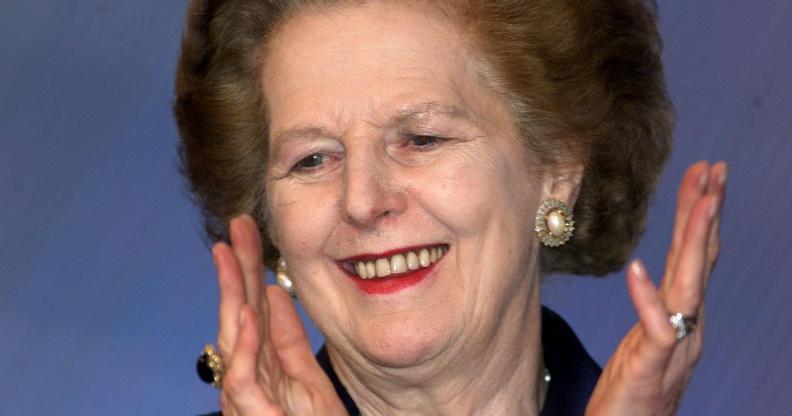LGBT History Month: The bold, very British resistance to Section 28

The homophobic legislation Section 28 was introduced by Margaret Thatcher in 1988. (AFP via Getty/ GERRY PENNY)
Throughout the 1980s, some local councils in Britain attempted to provide positive representations of gay people in schools.
Some quarters of the national press described such councils as “loony”, and also printed scare stories about gay men and HIV/Aids. In 1987, a survey indicated that 64% of the British public thought that homosexuality was always wrong. The legislative response was Section 28, which said local authorities shall not “intentionally promote homosexuality”.
Passed in 1988, the law was largely symbolic, sending a message to LGBTQ+ people that they were not wanted. As a result of Section 28, many teachers were unsure how to tackle homophobic bullying in schools, let alone relevant sex education, so the law caused untold damage to the development of thousands of people who grew up under it.
But people did not just sit idly by and wait for the law to be changed. Opposition to Section 28 came in many forms, from reasoned arguments on live radio to mass protests.
In researching the history of Section 28, I was struck by the way that the British national character comes across in many of the protests. Take for example the January 1988 debate between actor Ian McKellen and Peregrine Worsthorne (editor of the Sunday Telegraph). A few weeks earlier, Worsthorne had written a column referring to the “bold and brazen, proselytising cult” of homosexuals, of which many members had “positively flaunted their aberrant sexual tastes”. The debate is memorable for being the moment McKellen publicly came out as gay. But what makes it even more interesting is how well-mannered McKellen and Worsthorne are to one another, despite the clear divergence of opinion and the potential for it to descend into a screaming match.
Sangfroid was also in the air on May 23, 1988, the day before Section 28 became law. A group of young women, concerned about the lack of news coverage, invaded a live broadcast of the BBC’s Six O’clock News. They gained entrance to the building, bursting onto the studio floor at the start of the programme. The news crew were shocked, with the director shouting “Fucking hell, we’ve got nutters in the studio, get ‘em out! Get security quickly!”
There was no going back, though, so the presenters had to muddle through. A newsreader, Nicholas Witchell, sat on one of the protesters off-screen, placing his hand over her mouth. Meanwhile, presenter Sue Lawley read through the headlines, apologising to viewers: “If you’re hearing quite a lot of noise in the studio at the moment. I’m afraid that, erm, we have rather been invaded by some people who we hope to be removing very shortly.” It’s the slightly incongruous use of “rather” which makes this such a typically British statement – conveying a nonchalant air of detachment when everything around you is falling apart.
Even the protesters displayed their perfect manners during the invasion, with one saying “thanks very much” as she was cut free from her handcuffs. One protester expressed dismay at Witchell’s response to the invasion, saying in an interview: “I couldn’t believe his language, especially someone from the BBC. It seemed so out of character and, in my opinion, so unnecessary.”
Protest with pizzazz
These kinds of invasions evoked a characteristically British madcap humour, reminiscent of the Carry On film series. Another instance of direct action against Section 28 took place in the House of Lords on February 2, 1988. This was characterised by a bit of bungling, a lot of luck and an enormous amount of chutzpah. A group of women tied lengths of clothesline around their waists – one of these makeshift ropes even fell to the ground as they were in the line for security, but nobody spotted that. After watching the Lords take a key vote on Section 28, they tied the lengths of line to the balcony and climbed down them to the floor.
While the shocked Lords and Ladies looked on, the women scuffled with the ushers, with one almost losing his trousers. During the fracas, two women simply walked out of the building, while those who did not escape were handled in a most civilised way. They were put in a cell under Big Ben for a few hours, given tea and coffee and allowed to watch television, then later released without charge. The arresting officer even took them on a tour to the cell where suffragette Emily Pankhurst had been held.
Section 28 was eventually repealed in 2003 and is seen as a stain on British political history. However, it should also stand as a testament to the indefatigable spirit of those campaigners, who deserve to be remembered for the calm, inventive and often hilarious ways that they protested an unfair law.![]()
This article is republished from The Conversation under a Creative Commons license. Read the original article.

